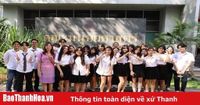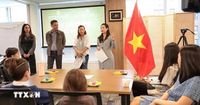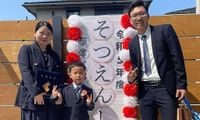The importance of Vietnamese language and culture continues to flourish as the diaspora in various countries increasingly feels the need to preserve their heritage. In particular, Vietnam's language is gaining traction among students in Thailand and expatriate communities in the United States.
At Srinakharinwirot University in Bangkok, Professor Anchalee Chansem, head of the Humanities department, reports that Vietnamese has been taught there for over a decade. "I believe that since we live in the same ASEAN community, understanding each other about both language and culture will strengthen our bond and for our students' careers in the future," she emphasized. This has led to an impressive number of students taking up the language as part of their academic journey, viewing it as a practical tool for building professional opportunities.
The enthusiasm for learning Vietnamese has also been supported by the Vietnamese Embassy in Thailand, which organized the first Vietnamese-speaking contest in November 2024. This competition attracted students from five different universities, further solidifying the language's presence in Thailand. Prof. Anchalee highlighted the growth in interest and says, "Vietnamese is a very advantageous language for students because they can see it as a tool for job applications.”
Meanwhile, on the other side of the globe, there's a firm commitment to promoting the Vietnamese language among children of expatriates in the United States. On March 22, 2025, New York City witnessed the kickoff of a free Vietnamese language class for children of the Vietnamese community, coordinated by the Permanent Mission of Vietnam to the United Nations and Columbia University's Vietnamese Language Program. Ambassador Dang Hoang Giang expressed his support, remarking, "This is a meaningful activity aimed at enhancing the promotion of Vietnamese culture and language among the Vietnamese community in the US.”
Children aged six to fourteen make up the group of eager learners, most of whom were born in the US and face challenges in maintaining their cultural language. These classes provide them with invaluable opportunities to connect with their roots while learning about Vietnamese traditions and history in a lively environment.
In a similar vein, Vietnam's Consulate General in Laos has organized a training course focused on teaching Vietnamese. From March 22 to April 6, 2025, this initiative will involve 25 teachers from Lao-Vietnamese Friendship Schools and Vietnamese centers, with former Dean of the Faculty of Vietnamese Studies and Language, PGS.TS Nguyen Thien Nam, leading the session.
"There are frequent needs expressed among the diaspora to maintain their language, particularly during the formative years of their children," said Ms. Hoang Thi Thu Thuy, the admin of the forum "Teaching Children to Learn Vietnamese" that boasts over 7,000 members. She expressed the desire of parents to ensure their children not only adapt to their new environments but also remain grounded in their cultural identity.
In recounting her own experience, Ms. To Thi Thu, a Vietnamese mother living in Japan, shared the struggle of maintaining her child's ability to speak Vietnamese while adapting to a new linguistic environment. Since moving six years ago, she and her husband have employed various methods, including hiring a tutor for their son, who speaks Japanese fluently. However, the worry persists about his connection to the Vietnamese language and culture.
"I ask myself whether this compromise is too great," she pondered, reflecting on her family’s situation where her son seems to excel in Japanese but struggles to articulate experiences in Vietnamese.
This balancing act is not unique to Ms. Thu. Other families like Ms. Quynh Phan's in Florida also face similar anxieties regarding their children’s linguistic identity. She actively engages her daughter, instilling the importance of Vietnamese through summer trips to Vietnam and enrolling her in a Vietnamese language school. "I want my child to be proud of her heritage," Ms. Phan affirmed.
The trend of Vietnamese language learning abroad is marked by ongoing support from families and community initiatives geared towards ensuring the next generation remains firmly connected to their roots. As Ms. Thu Thuy notes, retaining the Vietnamese language among younger expatriates is vital for fostering a sense of identity and cultural pride. "It's essential for children to understand their roots and cultural pride," she asserted.
Through engaging educational experiences in various countries, the Vietnamese community shows a remarkable commitment to preserving their language and culture globally, ensuring that future generations can navigate their identities with ease.







